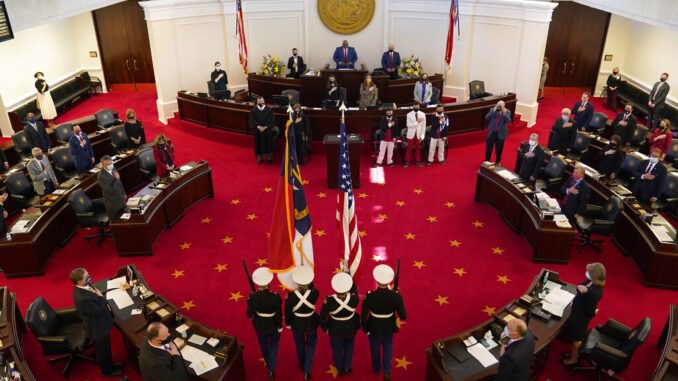
RALEIGH — State Senate Republicans rolled out a comprehensive tax-cut package last week which they say would “result in a 21% income tax cut for a family of four earning the median household income.”
“The state has had budget surpluses six of the last seven years. We have billions of dollars in unreserved cash,” Sen. Paul Newton (R-Cabarrus) said in a statement. “The Republican philosophy when government collects more money than it needs is to give it back through tax relief, and that’s what we’re doing here.”
The new tax proposals, House Bill 334/Senate Bill 112, are part of a package working through Senate committees before it is expected to reach the Senate floor.
Senate lawmakers said the proposal will “disproportionately benefit” lower income earners, citing that the percentage of filers earning less than $50,000 per year would drop from 10% to 8.8% while those making $200,000 would pay a larger share, going from the current rate of 43.4% to 44.9%.
The Associated Press reported that Gov. Roy Cooper’s spokesman Ford Porter said, “The last thing we need is more sweeping tax breaks for corporations and the wealthiest among us instead of investments in our hard working families and communities.”
North State Journal reached out to Gov. Cooper for comment but did not received a response.
“After a year where we saw inequities exposed and exacerbated, North Carolina Republicans in the General Assembly are still prioritizing the wealthy and big corporations, while income inequality rises and public education — one of the most powerful drivers of our economic future — suffers,” said North Carolina Democratic Party Chair Bobbie Richardson in a statement.
Republicans argued that that they have been able to increase education spending while continuing to cut taxes. An example given was the 39% increase in per-pupil spending.
“10 years of responsible Republican governance has left North Carolina in better shape than just about any state in the country. Our philosophy has always been when government has too much of your money, we should give it back to you,” Senate Leader Phil Berger (R-Eden) said of the package.
The tax cuts for individuals are identical to that of Senate Bill 337, which also increases the standard state deductions. The increase to deductions will match the federal deduction rates for 2022. For example, a married couple filing jointly would see their deduction increase by $4,000, going from the current $21,500 to $25,500.
The personal income tax rate will go from 5.25% to 4.99%. For a family of four with a median income of $54,602 that means a savings of around $325.
The standard child deductions have expanded eligibility and would also increase. A family of four with a median income would see a $1,000 increase, going from the current $4,000 child deduction to $5,000.
The corporate tax rate would also be reduced by .5% beginning in 2024. That decrease will continue annually until it reaches zero in 2028. Six other states currently have no corporate income tax.
The bill seeks to reduce the franchise tax liability on corporations that have real property in the state by getting rid of certain tax bases used to figure those liabilities.
Included in the package is an “automatic grant” of $18,750 to businesses that received COVID-19 Job Retention Program funds, an Economic Injury Disaster Loan Advance, Paycheck Protection Program funds, money from the Restaurant Revitalization Fund, or Shuttered Venue Operators Grant Program funds.
According to the proposal’s summary, it also aims to:
- Simplify and reduce the franchise tax for some taxpayers by eliminating the two alternative franchise tax bases that are calculated on a taxpayer’s property investments in the state.
- Extend for two years the sunset applicable to mill-rehabilitation projects from Jan. 1, 2023, to Jan. 1, 2025, and the sunset applicable to rehabilitated railroad-station projects from Jan. 1, 2022, to Jan. 1, 2024.
- Expand the tax credit for rehabilitated railroad-station projects by modifying the conditions so that an additional project would qualify.
- Limit the gross premiums tax on surety bonds for bail bonds to the amount remitted by the surety bondsman to the insurer of the bonds, effective for taxable years beginning on or after Jan. 1, 2022.
- Modify the excise tax on cigars to tax online sales the same as in-person sales, and to cap the tax at 30 cents per cigar for all sales, whether in-person or online, effective on or after Jan. 1, 2022.
- Impose the state and local sales tax on short-term vehicle rentals by a peer-to-peer vehicle sharing facilitator, applicable to sales occurring on or after Oct. 1, 2021.
- End the transfer of the alternate highway use tax imposed on short-term vehicle rentals to the General Fund, so that all revenue generated by the alternate highway-use tax is credited to the Highway Fund.
- Exempt vaccines and commercial cemetery property from the local property tax base, effective for taxes imposed for taxable years beginning on or after July 1, 2022.
According to The Tax Foundation, if the current tax proposal is signed into law, the state would go from its current ranking of 10 to No. 5 on the group’s state business tax climate rankings. In 2011, North Carolina was ranked 46 in the country for business tax climate.



